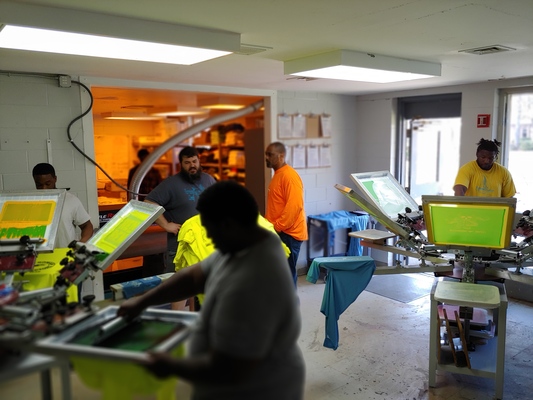When people are released from prison there is intense financial pressure. Income is necessary for housing, food, transportation, and to pay probation fees and child support. People must work to survive. And yet, securing employment alone doesn’t change patterns of criminal behavior. This reality is evidenced through research and our persistently high recidivism rates.
The fact is that most people need a job + other specialized services to help them succeed after prison.
People released from prison have many needs that directly impact their ability to stay out. Securing a job makes one aspect of a person’s life more pro-social, but it’s not nearly enough. How can a person work a full-time job and also engage in the breadth of services they need to stay out of prison? They can’t and they don’t.
Forcing people to choose between working and receiving services contributes to our failed reentry system.
Forcing people to choose between working and receiving services contributes to our failed reentry system. It’s no wonder that two-thirds of people return to prison within three years of their release.
If we truly want to help people stay out of prison, then we must provide high-quality, evidence-based services in tandem with employment. Reentry organizations must offer work into the scope of their services.
Luckily, there’s a solution. The social enterprise.
What is a social enterprise?
Social enterprises are businesses created to further a social purpose in a financially sustainable way. They have both business goals and social goals. Goods and services are sold to consumers and profits are reinvested back into the social mission.
Reentry nonprofits can, and should, run a social enterprise to employ people returning from prison in addition to providing other services. Of course, social enterprises can’t employ all 700,000 people returning home from prison each year. But they don’t need to. Not everyone released from prison wants to work, can work or needs a lot of other services in tandem with work. But for those who do, the social enterprise is a key reentry service that can have major impact.
Three reasons why all reentry organizations should run a social enterprise
1. The social enterprise can integrate work with therapy shown to reduce recidivism
We know by now that simply giving a person released from prison a job does not reduce their chances of going back.12 People who struggle to live crime-free often need help developing pro-social thinking, emotion-regulation, and problem-solving skills to manage life differently. Cognitive behavioral therapy (CBT) targets the thoughts, feelings, and behaviors associated with criminal recidivism and it’s one of the most effective interventions for reducing recidivism among juveniles and adults.
Research shows us that it can take 100+ hours of CBT to change the attitudes, beliefs, and behavior of people at a higher risk to re-offend.3 Access to this amount of therapy is almost impossible for people leaving prison who face a myriad of reentry challenges, including the need to work and support themselves.
The social enterprise solves this problem.
Reentry organizations that run a social enterprise can provide employment alongside significant amounts of therapy. Participants easily move between group therapy, individual counseling, and work throughout the day. Classes are delivered by program staff in the same building where the participants work. CBT principles are reinforced consistently by all staff, including work supervisors. The length of the program can be tailored to the amount of support a person needs.
2. The social enterprise allows people to work and address their reentry needs.
The social enterprise offers a flexible work environment that supports the reentry process.
Those who are most likely to be re-arrested often need help developing emotional coping, thinking and problem-solving skills to manage life differently. They need help establishing a new positive support network. Many need substance abuse, medical and mental health treatment. Therapy, medical appointments, DMV visits, and probation meetings all take place during the workday which conflicts with regular, full-time employment hours.
The social enterprise offers a flexible work environment that supports the reentry process. A case manager helps a person connect with critical community resources, schedule appointments and coordinate transportation. Work absences are excused when a person is off-site accessing other services or meeting with their probation officer.
3. The social enterprise supports a work environment that teaches news ways of thinking and acting.
Being unemployed and having an unstable work history are predictors of recidivism. But simply helping someone find a job doesn’t address the underlying reasons why a person hasn’t had success at work. Reducing recidivism and helping people change patterns of criminal behavior is much more complicated than that. People who go to prison often have unstable work histories well before the first time they’re incarcerated, and they have difficulty holding onto jobs later in life.4
If a reentry organization’s goal is to reduce recidivism, shaping the work environment is an excellent strategy to help people develop new ways of thinking and acting. The social enterprise can be designed specifically to both teach and reinforce pro-social behavior. Managing conflict in pro-social ways, responding appropriately to authority, and pushing through frustrations without quitting are all skills that can be taught by program staff and reinforced by work supervisors to help someone succeed on the job and in life.
There’s no question about it. The social enterprise has major potential to both improve post-prison employment outcomes and reduce recidivism.
As long as employment stays outside the scope of reentry services, people will be forced to choose between working and receiving the help they need to stay out of prison. It’s time to change that.
